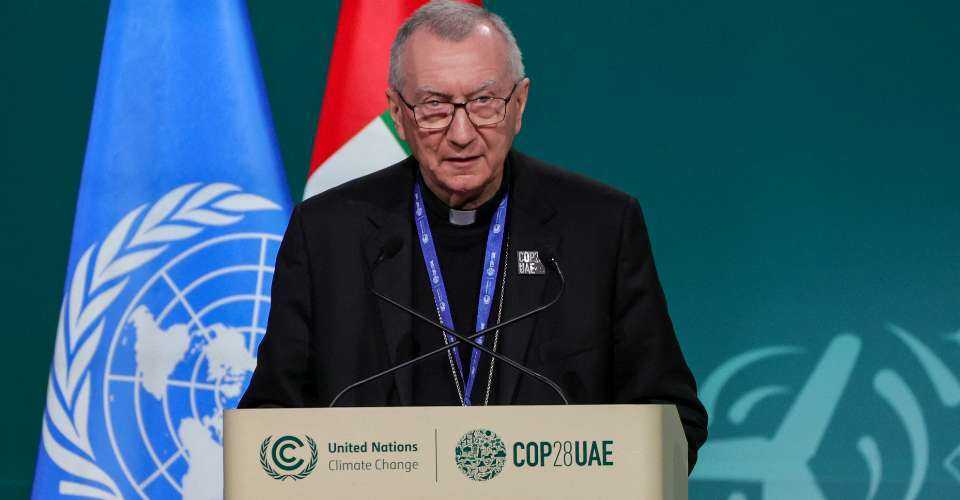
Cardinal Pietro Parolin speaks during the United Nations climate summit in Dubai on Dec. 2, 2023. The Vatican’s secretary of state played a key role in the 2018 Vatican-China secret pact. (Photo: AFP)
Vatican’s Secretary of State Cardinal Pietro Parolin has said that all parties are interested in renewal of the 2018 Sino-Vatican pact and expressed hope of further developing ties with the communist nation.
Parolin gave his remarks on the sidelines of an international conference themed “100 years since the Concilium Sinense,” organized by the Pontifical Urban University in Rome, the Vatican News reported on May 21.
The conference, organized in collaboration with the Vatican’s missionary news service Fides and the Pastoral Commission for China, was to commemorate the first and so far the only Synod of the Catholic Church in China held in 1924.
The Shanghai Synod had affirmed the need for foreign missionaries in China to give way to local church leaders.
“We are all interested in renewing [the agreement] and also developing some points,” Parolin said, referring to the secret Vatican-China agreement on the appointment of bishops that is due for renewal in October 2024.
Parolin expressed hope that the Catholic Church would have “a stable presence in China.”
“Even if initially, it might not take the form of a pontifical representation or an apostolic nunciature, it could still increase and deepen our contacts. This is our goal,” Parolin emphasized.
The conference was attended by Bishop Joseph Shen Bin of Shanghai, and Zheng Xiaoyun, president of the Institute of World Religions at the Chinese Academy of Social Sciences, among others.
Professor Elisa Giunipero, a lecturer in Chinese history at the Catholic University of Milan, and Professor Vincenzo Buonomo, pontifical delegate to the Pontifical Urbaniana University, also participated in the conference.
Parolin also lauded the efforts of Archbishop Celso Costantini, the first apostolic delegate to China, who organized the Synod in China.
“Costantini saw the urgency of moving from the concept of ‘foreign missions’ to that of ‘missionary Church,’ and supported the ordination of the first six Chinese bishops in 1926," Parolin said.
Reportedly, Costantini founded the Congregation of the Disciples of the Lord in 1927 and promoted Chinese artistic and architectural forms, “through which the inculturation of the Catholic faith could further materialize.”
Parolin emphasized that efforts will be made to “build the Church in China into a holy and Catholic Church that conforms to God's will, accepts the excellent traditional cultural heritage of China, and is welcomed by Chinese society today.”
Shen pointed out that the Church in China has “always remained faithful to its Catholic faith while striving to constantly adapt to the new political system,” which was established in 1949 following the end of the Chinese Civil War.
“The religious freedom policy [during 1949] implemented by the Chinese government had no interest in changing the Catholic faith,” the prelate added.
The policy only hoped that clergy and faithful Catholics would defend the interests of the Chinese people and free themselves from the control of foreign powers, Shen further said.
He also recalled that some of the past problems between the Church and the Chinese authorities were partly due to “the strong sense of European cultural superiority” of some missionaries.
The missionaries “even intended to use the Christian religion to change Chinese society and culture,” which was “inevitably opposed and even detested by many Chinese,” Shen emphasized.
The situation had “hindered a greater spread of the Gospel of love among the Chinese people,” the prelate lamented.
Shen also reaffirmed that the Church in China would follow a path of Sinicization that aligns with today’s Chinese society and culture.
Among the other speakers of the conference, Giunipero recalled “the significant and often underestimated influence of Catholic missions in China and the world.”
"From the Church in China has come the impetus for change that has transformed the Church in mission territories," helping to imagine a Universal Church that is “no longer just the bearer of European culture,” Giunipero said.
The Vatican placing its trust in the Chinese clergy “greatly helped the Church withstand the difficulties in the decades that followed,” Giunipero added.
Another speaker, Zheng, citing government data pointed out that there were 98 dioceses, nine institutes, 6,000 churches, 6 million believers, and over 8,000 religious in China, and expressed hope that the China–Vatican agreement would be renewed.


